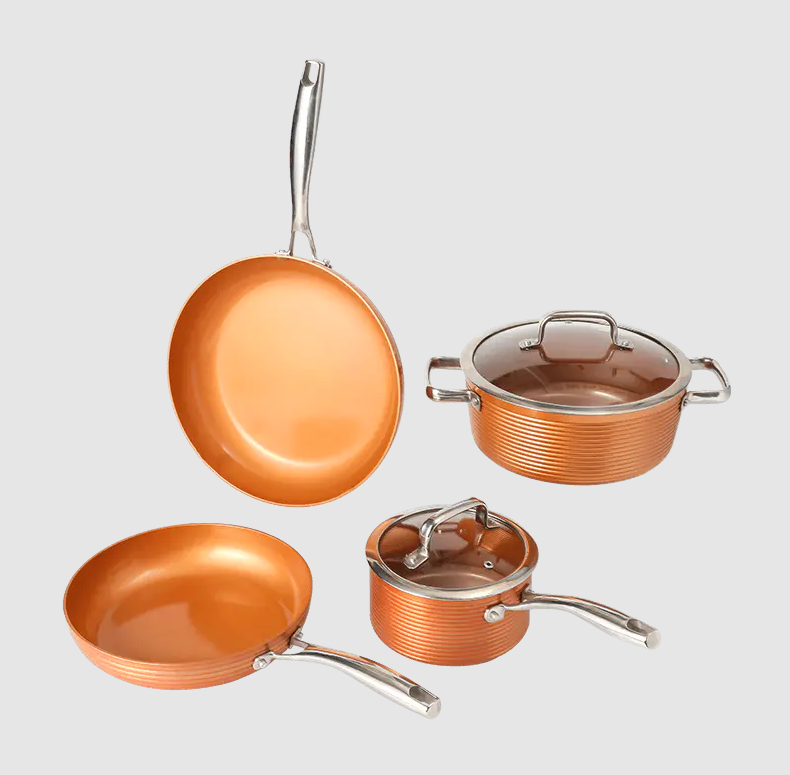Why Pressed Cookware Thickness Matters for Consistent Cooking Results

Pressed Cookware, widely used for its affordability and lightweight design, is created by stamping flat sheets of metal into shape under high pressure. While this manufacturing method is efficient and economical, one of the most critical factors that determines the performance of Pressed Cookware is the thickness of the metal used during the pressing process. Thickness plays a central role in how cookware responds to heat, impacting not only how fast it heats up but also how evenly it distributes and retains that heat during cooking.
In general, thinner Pressed Cookware heats up quickly, which can be useful for fast cooking tasks where speed is more important than heat consistency. However, rapid heat-up often comes at the cost of even distribution. Thin bases are prone to developing hot spots—areas where the heat is significantly more intense than in surrounding zones. This can lead to uneven cooking, especially problematic for tasks like browning meat or making delicate sauces where precision is key. Moreover, thin metal does not hold heat well. Once the pan is removed from a heat source, the temperature drops rapidly, which can interrupt cooking or require constant reheating.
On the other hand, thicker Pressed Cookware provides a more stable cooking surface. With greater thermal mass, these thicker pans or pots heat more gradually but retain that heat longer. This helps reduce temperature fluctuations when ingredients are added to the pan and contributes to more uniform cooking across the surface. Thicker cookware is also more resistant to warping, which is a common issue with very thin Pressed Cookware subjected to sudden temperature changes, such as being rinsed in cold water while still hot.
The material of the cookware further influences this relationship. Aluminum, a popular choice for Pressed Cookware due to its high thermal conductivity, performs very well in both thin and thick forms. However, thinner aluminum cookware is softer and more susceptible to dents and deformation. Stainless steel is more durable but conducts heat less efficiently, making thickness even more essential for maintaining thermal performance. Many manufacturers combine metals to overcome these weaknesses, offering Pressed Cookware with layered bases that include a conductive aluminum or copper core surrounded by more durable steel.
In practical terms, consumers should evaluate Pressed Cookware not just by price or appearance but by considering the thickness and material composition. For occasional use or light cooking, thinner options may suffice. But for everyday use, especially for tasks requiring even heat like searing or simmering, thicker Pressed Cookware is more reliable. Many modern models now incorporate technologies like impact-bonded bases or encapsulated cores specifically to improve heating performance while preserving the benefits of pressed construction.
In conclusion, the thickness of Pressed Cookware has a significant impact on its heating performance. While thin cookware may offer quick heating and lighter handling, thicker Pressed Cookware delivers better heat retention, even distribution, and structural durability. Choosing the right thickness based on your cooking needs ensures better results and a longer-lasting product, reaffirming that in the world of cookware, thickness truly matters.
Aluminum body with non-stick marble coating for easy cooking and cleaning; BPA-free
Bakelite handles stay cool during use, vented glass lids let steam escape
Spiral bottom heats evenly; compatible with gas, electric, and glass stovetops (note: not induction compatible)
Hand wash only, not dishwasher safe; please check the size of your stovetop's hobs before purchasing
Please use low to medium heat; extremely high temperatures can cause handle and coating damage
- Art
- Causes
- Crafts
- Dance
- Drinks
- Film
- Fitness
- Food
- Jogos
- Gardening
- Health
- Início
- Literature
- Music
- Networking
- Outro
- Party
- Religion
- Shopping
- Sports
- Theater
- Wellness


